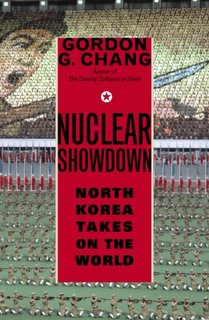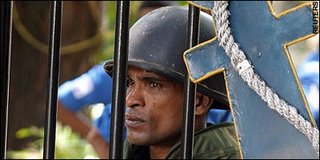
I attended two guest lectures recently by Gordon Chang, author of
Nuclear Showdown: North Korea Takes on the World (Random House, 2006), and Minxin Pei, author of
China's Trapped Transition: The Limits of Developmental Autocracy (Harvard University Press, 2006). While neither has all the answers, both makes excellent observations in their books and speeches. Now that the Democratic People's Republic of Korea has institutionalized brinksmanship, Chang advocates a change in diplomacy--one that combines a reduction in the American nuclear arsenal and applications of all available leverage on the Republic of Korea and Communist China. Now that the People's Republic of China has compartmentalized being classically liberal abroad and positively illiberal at home, Pei advocates critical engagement--one that combines associating and talking to Chinese Communists and being honest enough to criticize them they are paying a price when there is a gap between economic growth for an increasing number of Chinese people and the monopoly of political power in the Chinese Coummunist Party. By the way, the journal
Foreign Affairs (July/August 2006) has a
review of Pei's book. I recommend both books.
 Thom Shanker comments on the diplomatic visits by U.S. Secretary of State Rice in northeastern Asia in "News Analysis: A fragile consensus on North Korea" (International Herald Tribune, 22 October 2006.) .... South Korea feels most threatened by the North's nuclear program, but also the most exposed, and a number of opinion leaders in the South are doing all they can to rescue Seoul's policy of engaging, not isolating, the North, redrawing their lines in the sand while North Korea keeps blowing over them. ... Rice acknowledged during her journey that Iran, with its own nuclear ambitions, was watching her efforts. She left one senior advisor in Asia to continue discussions of sanctions, while another spent time at the working-group level to devise specific goals and rules for monitoring and inspecting North Korean cargo. Administration officials say these initial steps forward already may be influencing North Korean decisions to hold off on a second test, and that over time a strict sanctions architecture can be erected to contain the North's nuclear ambitions and prevent the transfer of weapons to another state or terrorists. ... Another interesting webpage: An interactive graphic on the North Korean border with China and Russia accompanies an article by Norimishu Onishi, "Tension, Desperation: The China-North Korean Border," in the New York Times (22 October).
Thom Shanker comments on the diplomatic visits by U.S. Secretary of State Rice in northeastern Asia in "News Analysis: A fragile consensus on North Korea" (International Herald Tribune, 22 October 2006.) .... South Korea feels most threatened by the North's nuclear program, but also the most exposed, and a number of opinion leaders in the South are doing all they can to rescue Seoul's policy of engaging, not isolating, the North, redrawing their lines in the sand while North Korea keeps blowing over them. ... Rice acknowledged during her journey that Iran, with its own nuclear ambitions, was watching her efforts. She left one senior advisor in Asia to continue discussions of sanctions, while another spent time at the working-group level to devise specific goals and rules for monitoring and inspecting North Korean cargo. Administration officials say these initial steps forward already may be influencing North Korean decisions to hold off on a second test, and that over time a strict sanctions architecture can be erected to contain the North's nuclear ambitions and prevent the transfer of weapons to another state or terrorists. ... Another interesting webpage: An interactive graphic on the North Korean border with China and Russia accompanies an article by Norimishu Onishi, "Tension, Desperation: The China-North Korean Border," in the New York Times (22 October).




